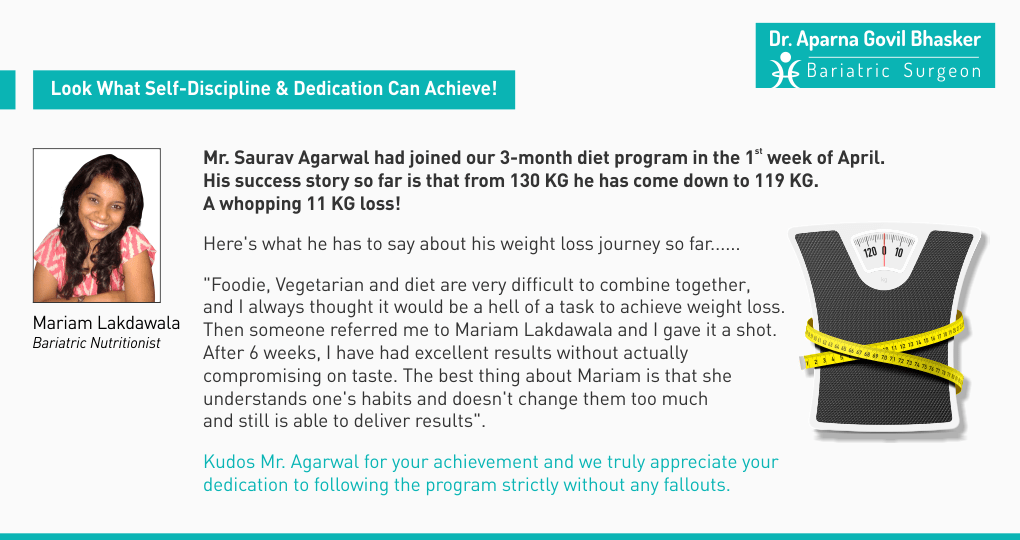
Best Weight Loss Dietitian & Nutritionist in Mumbai, India
- Home
- Dr Aparna Govil Bhasker – Bariatric Surgeon & Weight Loss Doctor in Mumbai, India
- Best Weight Loss Dietitian & Nutritionist in Mumbai, India
Best Weight Loss Dietitian & Nutritionist in Mumbai, India
“A huge part of losing/ gaining weight is believing you can do it and realizing it’s not going to happen overnight”
Losing and gaining weight is often perceived as a game of managing only the total calories, but unfortunately it’s not as easy. Losing/ gaining weight has to be done in a gradual way by following a supervised path. The ultimate goal of the entire process should not be weight loss/ gain, but weight maintenance. Unfortunately this kind of goal setting is not followed by many ‘not very qualified’ famous dieticians/ keto dieticians/ celebrity nutritionist due to commercialization.
Let us look at the few common causes and concerns of being overweight/ obese and being underweight,
| Overweight (BMI>23 Kg/m2) / Obese (BMI > 27.5 Kg/m2) | Underweight (BMI <18 Kg/m2) | |
| Causes | Genetics
Sedentary lifestyle – desk job, lack of physical activity Stress Erratic eating pattern – no fixed eating timings, skipping meals Erratic sleeping pattern Eating disorders – Emotional eating Hormonal imbalances Medications like steroids, insulin etc
|
Genetics
Metabolism – Hyperthyroidism Eating disorder like anorexia nervosa and bullemia Poor appetite Illness Stress Medications – which suppress appetite |
| Concerns | o More prone to getting metabolic diseases secondary to obesity like type II diabetes mellitus, high cholesterol, high blood pressure, non-alcoholic fatty liver disease, cardiovascular disease, musculoskeletal disease and certain cancers etc
o Low quality of life, body image dissatisfaction, low self-esteem pre-disposes them to depression o Hormonal imbalance in women – eg: PCOD, Infertility
|
o More prone to infections due to weak immune system
o Low muscle mass o Lack of food intake makes them prone to nutrient deficiencies o Could experience hormone imbalance |
In the last few decades the number of underweight individuals has decreased, however the incidence of obesity has increased exponentially.
Until now obesity has not received the disease status. Majority of obese individuals want to lose weight because they want to look good, attain a perfect figure/ body, fit in small size clothes, etc. They fail to realize that obesity is a disease which increases the risk of many other life threatening diseases. Hence it is very important to treat overweight/ obesity with the same seriousness as any other disease.
Dietary and lifestyle management forms the base of the treatment pyramid of obesity. In order to achieve better weight loss outcomes, a holistic approach works very well. Along with diet it is also important to correct the erratic lifestyle pattern by being physically active, eating the right food at the right time, using techniques to de-stress and maintaining sleep cycle as per the biological clock.
Generally people have false notions about dieting. They feel dieting will lead to starvation, will include luxurious/ fancy foods, it is just a temporary way of losing weight fast,…so on. Many people expect miraculous overnight results with diet, such unrealistic expectations have given rise to a huge market of quacks. To prevent falling for such quacks, it is wise to opt for a weight loss diet program by a qualified nutritionist.
Weight loss is not only about restricting the total calories, but also about managing the quality of the restrictive diet. Currently many crash diets like the cabbage soup diet, detox diet, grapefruit diet, atkins diet, etc. are trending on the internet and being endorsed by many famous dieticians/ celebrity dieticians. However it is important to understand that crash diets cannot be followed more than a day or two.
- These diets are extremely low calorie diets
- Are not able to provide the daily recommended intake of various nutrients and can add to the pre-existing nutrient deficiencies commonly found in the obese population.
- The chances of weight regain are very high if the crash diet is abruptly stopped. This is because the body gets adjusted to the reduced calorie intake. Once the normal diet is resumed the lost body weight bounces back as the body works on survival mode and doesn’t use the surplus calories.
- For ensuring faster weight loss, many commercial weight loss centres endorse certain powders, flours, capsules, fat burners, etc. It is very important to know the composition, side-effects, action and interaction with drugs, etc. of these preparations before using it.
Another diet that is being endorsed by many famous dieticians/ sports dieticians/ keto dieticians/ celebrity dieticians, is the ketogenic diet. It is basically a very low carbohydrate, high protein and a high fat diet. It works by increasing the fat burning capacity of the body and has shown to have very good weight loss outcomes. However ingestion of a high fat diet, results in the ingestions of more than recommended levels of bad fats (saturated fats) which is not good for heart health. Also ketogenic diet is contraindicated in many clinical conditions. Hence it is advisable to follow this diet only under the guidance of a certified keto dietician.
Non- compliance is seen to be higher with these crash diets because of its restrictive nature and various side-effects. Non-compliance with any type of weight loss diet leads to the “Yo – Yo effect”, which is nothing but weight loss followed by weight regain and the cycle begins again. This Yo – Yo effect leads to a lot of demotivation and becomes another reason for non-compliance. The weight loss diet package is designed by our dieticians in a way that helps to break this vicious cycle.
At our diet clinic, Mumbai, dieting is considered as a phase wherein, the body and mind has to be conditioned to make positive permanent changes in the eating pattern and behaviour. During this phase our diet doctor will guide you to make a smooth and realistic transition towards a healthier lifestyle, keeping in mind your food preferences.
Diet for weight loss
Unlike many other fat loss clinics/ weight loss centres, the diets designed by our weight loss dietician are customized as per your food preferences, working hours, likes & dislikes, affordability, etc. It works on the principle of calorie restriction, and is planned in such a way that it eliminates empty calorie foods (foods that give more calories and less nutrition) and includes nutrient dense foods.
Based on your medical history and a detailed 24 hour recall obtained at baseline, our clinical nutritionist plans the diet in 2 phases
Phase 1: Streamlines the quality of the diet by eliminating high calorie – less nutritious foods. This automatically ensures reduction in the total calorie consumption. This phase focuses on the overall quality of the diet by correcting food choices, portion sizes and timing of food consumption
Phase 2: Gradual reduction of total calories, without compromising on the nutrient intake.
A very low calorie diet is used very less frequently prescribed by our dietician. Our diet quality is such that the feeling of being starved is not experienced by our patients. We do not recommend starvation for weight loss.
Our weight loss plans are as follows:
- 1 Month plan:
- Investigations/ tests to be done at enrolment
- Includes follow-up once in a week (Total: 4 f/u’s)
- 1st and last follow-up in person or on video call is a must, the rest can be in-person/phone/ email follow ups as per the client’s choice
- The cost of the supplements is not included in the plan
- At each follow up patient will receive a revised diet sheet with dietary recommendations
- If the diet is followed strictly as prescribed the expected weight loss is 1.5-3 Kg
- Cost of the package: 2500/-
- 3 Month plan:
- Investigations/ tests to be done at enrolment
- Includes follow-up once in 10 days
- To meet the dietician in person or on video call at least twice a month (To reinforce), the rest can be in-person/phone/ email follow ups as per the client’s choice
- The cost of the supplements is not included in the plan
- Patients will be given some healthy recipes, a hand out of Do’s and Don’ts of a weight loss diet, list of healthy substitutes of unhealthy foods, information on nutrition label on packaged foods, etc
- If the diet is followed strictly as prescribed the expected weight loss is 6-8 Kg
- Cost of the package: 6000/-
An extension of 1 month on each of the plan is possible at the cost of 2000/-
Diet packages for weight gain
The diet packages by our dietician for weight gain works on the principle of high calorie – high quality diet. The emphasis of the program is to enable more of muscle mass gain and less of fat mass gain by suggesting a well-balanced high calorie – high protein diet and suitable exercises. Since the focus is on muscle gain the process of weight gain is very gradual.
The follow-up schedule and cost of the weight gain packages are same as the cost of the weight loss packages.
The USP of our diet clinic, Mumbai is that we focus more on patient education as we understand that maintaining weight is even more challenging than weight loss/ gain.
By the end of the plan our patients learn to
- Make healthier food choices,
- Maintain a healthy eating pattern,
- Be a mindful eater,
- Read the nutritional label on packaged foods which enables them to pick up authentic diet foods available in the market.
This knowledge is very important as it enables the patients to successfully maintain weight after weight loss/ gain.
On enrolment at our diet clinic, we ask the patients to undergo a small list of tests so as to determine their nutritional status and rule out nutritional deficiencies or clinical conditions that could contribute to the weight gain/loss.
Based on the nutritional status and clinical condition, multi-vitamins, any particular nutrient supplementation (depending on the deficiency), protein supplements, diet foods, etc are prescribed by our clinical nutritionist. These nutraceuticals are thoroughly checked for their ingredients before being prescribed by our diet doctor.
Role of physical activity in weight loss/ gain:
Dietary management or physical activity alone will not be able to give you the desired outcomes. A synergy between the two works wonders in case of both weight loss and weight gain.
For weight loss:
Calorie restriction alone has shown positive results in weight loss. However physical activity along with calorie restriction leads to greater weight loss. As per the current American College of Sports Medicine (ACSM) recommendations, 225-420 minutes/week of moderate to vigorous physical activity in addition to a calorie restricted diet, has shown to promote significant weight loss.
It is also very important to know the type of physical activity that will result in better weight loss. Aerobic exercise training is more effective for fat loss whereas resistance exercise training helps in preventing muscle loss.
As discussed earlier that the ultimate victory of any weight loss program is weight maintenance, hence it is important not to stop exercising after weight loss. Exercising for 200-300 minutes/week as per the ACSM guidelines will prevent the weight from coming back.
For weight gain:
It is very important to ensure that the muscle mass gain is in proportion to the fat mass gain. Thus, physical activity in combination with a high protein – high calorie diet will result in a healthier weight gain. For muscle mass gain resistance exercise training is more effective than aerobic exercise training. Again the challenge here is weight maintenance, for which it is very important not to stop exercising.
Exercising have many additional health benefits, it helps to improve cardiovascular health, bone metabolism, insulin sensitivity, mental health and the list goes on. It is rightly said, “Make exercise a way of life, it adds to the quality of it.”
Weight Loss Diet Testimonials
Diet Frequently Asked Questions (FAQs)
Diet for all
Our diet clinic, Mumbai is open for other clinical conditions as well. These includes type I & II diabetes mellitus, kidney disease, heart diseases, gout, PCOD, etc. Our clinical nutritionist can help you to manage these clinical conditions by planning a disease specific and customized diet plan suiting your preferences.
In case you are not from Mumbai, not to worry. Our clinical nutritionist can provide you online diet consultations.
About Dr. Aparna Govil Bhasker
Dr. Aparna Govil Bhasker is an accomplished Bariatric Surgeon and Laparoscopic GI Surgeon. Extremely passionate about her field of specialization. She completed her MBBS and MS in General Surgery in 2006, from Mahatma Gandhi Institute of Medical Sciences (MGIMS), Sewagram. Set up in 1967 by none other than the first health minister of India, Ms. Sushila Nayar, MGIMS is deeply rooted in Gandhian ethics. Read more


Surgeon in India


Bariatric Surgery: Pros and Cons

Types of Hernias and Their Treatment Options Explained
- Intra-Gastric Balloon Insertion Surgery
- Laparoscopic Adjustable Gastric Banding Surgery
- Gastric Sleeve Surgery / Laparoscopic Sleeve Gastrectomy
- Single Incision Sleeve Gastrectomy Surgery
- Laparoscopic Roux-en Y Gastric Bypass Surgery
- Laparoscopic Banded Roux-en Y Gastric Bypass Surgery
- Laparoscopic Mini Gastric Bypass Surgery /Omega Loop Bypass
- Laparoscopic Sleeve Gastrectomy with Duodeno-Jejunostomy Surgery
- Laparoscopic Duodenal Switch Surgery
- Laparoscopic Sleeve Gastrectomy with Duodenal Ileostomy (SADI) Surgery
- Laparoscopic Revisional/Redo Bariatric Surgery
- Metabolic Surgery for Diabetes
- Terms & Conditions
- Privacy Policy
- Sitemap

